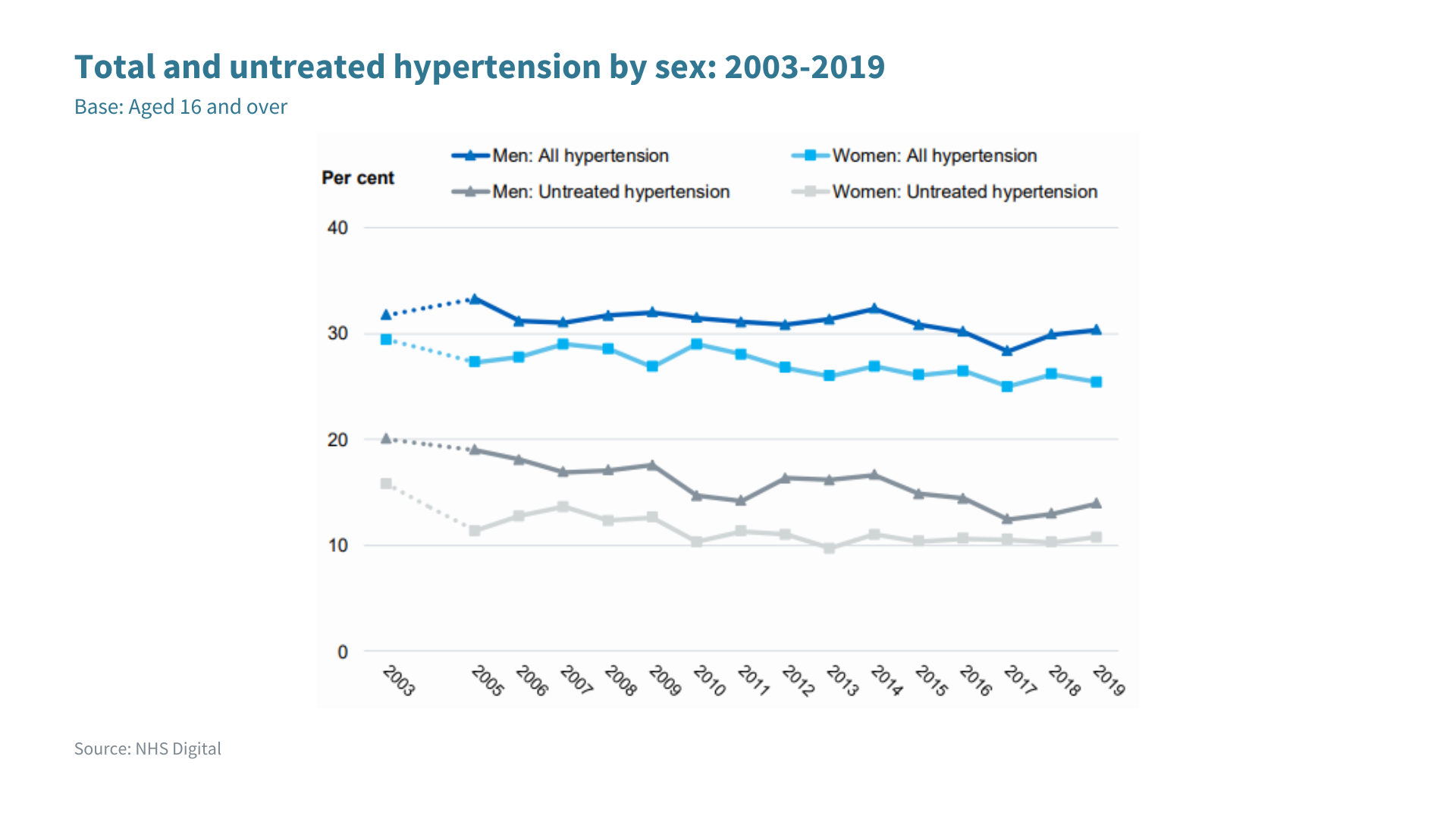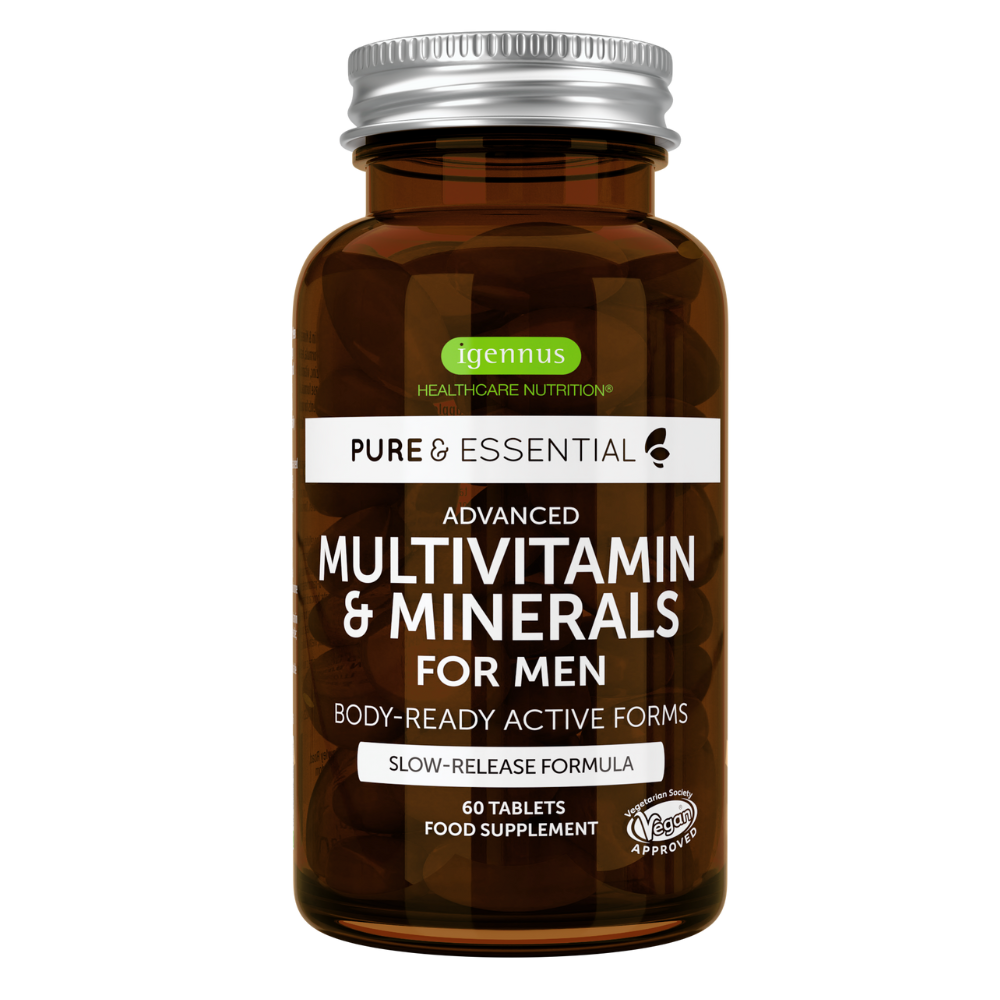Male health and nutrition
The human body provides subtle clues and indications of a person’s physiological health which can indicate nutrient status and future health risk. Some male-specific health afflictions may be difficult to discuss; for some men, fear of the unknown is a significant factor in their reluctance to seek support. General practice data collected in 2013 found that men were 32% less likely than women to consult over their initial health concerns via primary care unless they already had a defined diagnosis, which suggests that some understanding of a disease or condition makes it easier for men to seek ongoing guidance. (1) This article, therefore, aims to provide a foundation for knowledge, to support men on that initial path to seeking better health, and provide simple solutions to tackle even the most concerning male health problems.

Male Hormones
As with females, male hormone balance is fundamental to health, and often overlooked as a contributor to symptoms such as hair loss, reduced libido, infertility, excess abdominal fat, and even low bone mineral density. Male hormone dysfunction is associated with many of the conditions outlined in this article, and while hormone synthesis is key, hormone transportation and excretion are equally important.
Dehydroepiandrosterone (DHEA) and androstenedione are the building blocks of male hormones (androgens), primarily secreted in the testes with small amounts secreted from the adrenal glands, muscle, and abdominal fat tissues. In men, these androgenic precursors are converted into testosterone and small amounts of oestrogen. Around 10% of testosterone is then converted into its more active form, dihydrotestosterone (DHT) by an enzyme called 5α-reductase (5α-R) using vitamin B3 (niacin). (2,3)
Androgens are responsible for the growth and development of the male reproductive system, the increase in muscle and bone mass, and masculine physical characteristics. Androgens also contribute to energy production, libido and, interestingly, aggression. Levels decline naturally with age, potentially to support the transition from a natural desire to procreate in younger years to maintaining a stable family in later life. However, smoking, genetic mutations, dysregulated blood sugar, stress, exposure to certain chemicals, and excess abdominal fat can also reduce androgen levels and increase oestrogen instead.
Antioxidant vitamins and minerals such as zinc, selenium and vitamin E support sex hormone regulation and sperm health, whilst an antioxidant and fibre-rich diet containing fresh, organic fruits and vegetables (particularly cruciferous vegetables) promotes good hormone clearance. Adequate protein intake also supports hormone transportation within the body.
Hair loss and receding hairlines
It is believed that male pattern baldness, characterised by a distinct loss of hair around the crown and a receding hairline, strongly correlates with circulating DHT levels and genetic follicular sensitivity to DHT concentrations. 5α-R (the enzyme required for testosterone conversion) is abundant in head hair follicles and high levels of metabolic activity here can cause shrinkage of the hair root over time. (4) For this reason, many commercial hair loss products contain 5α-R inhibitors – aimed at blocking DHT metabolism. However, these can affect other areas of health typically influenced by androgens, such as the masculine characteristics mentioned above. As an alternative, supporting the status of nutrients required in hair growth, oxygen transport and metabolism, such as B-vitamins, magnesium, zinc, selenium, antioxidants, essential fatty acids, protein and iron (only if deficient), may help to regulate DHT sensitivity and reduce hair loss. (5,6)

Greying hair
Hair follicles are highly metabolic and therefore prone to higher levels of oxidative stress. Greying (unpigmented) hair is caused by a by-product of cellular metabolism: hydrogen peroxide, a reactive oxygen species (ROS) known for its bleaching effects. Smoking and psychological stress have also been shown to elevate circulating ROS levels. (7,8) Furthermore, the metabolic demands of men are naturally higher than women, and men are therefore more susceptible to the system-wide effects of oxidative stress. Providing ample antioxidants via the diet can help to quench the effects of oxidative substances. B12 deficiency can also be associated with prematurely greying hair, as well as iron, vitamin D3, zinc, calcium, and copper deficiency and this may be due to their roles in facilitating antioxidant and metabolic activity. (8)
Hypertension and cardiovascular health
Hypertension is defined as consistent high blood pressure in the systemic arteries and was reported by the NHS Health Survey for England 2009 as one of the most preventable and treatable causes of premature deaths worldwide, and is associated with the risk of stroke, heart and renal disease. (9) Men are reported to be less aware of their blood pressure status and yet are more prone to hypertension than women (see figure 1). (9,10) This is thought to be related to the propensity for men to accumulate more visceral fat than women (on the abdomen and around internal organs) and associated inflammation, although the exact mechanisms are not fully understood. (11,12,13)
Figure 1.

To support the heart and circulatory system it is important to consume a healthy diet rich in fruit, vegetables, fibre, antioxidants and omega-3s. Stopping smoking, reducing weight and stress, and decreasing consumption of sodium, alcohol, sugar and saturated fat are all suggested to help improve blood pressure status and reduce associated disease risk. (14) As hypertension is also linked to an inactive and sedentary lifestyle, physical activity can help to reduce high blood pressure; both aerobic and resistance exercise have been shown to have positive effects. Most governmental bodies suggest 5 x 30 minutes of medium-intensity exercise per week for prevention and intervention. (15)
Sexual dysfunction
Erectile dysfunction (ED) may indicate system-wide dysfunction and inflammation and can be a symptom of cardiovascular disease (CVD), metabolic syndrome and prostatic disorder. (16) Elevated levels of circulating insulin and triglycerides can cause more fat to accumulate in visceral tissue. Fat cells in this area produce an enzyme called aromatase which converts testosterone into oestrogen, causing a decrease in testosterone which may contribute to compromised sexual performance. (17) Furthermore, heavy alcohol consumption, frequent use of medication and recreational drugs and chronically elevated blood glucose levels can all burden the liver and directly affect sexual performance. (18)
High blood pressure is commonly implicated in ED and can lead to reduced elasticity in the walls of blood vessels and reduce penile inflow whilst limited oxygen transport to the penis (caused by smoking or sleep apnoea) can result in the loss of smooth muscle fibres which provide the penis with the rigidity required for erection maintenance. Sexual dysfunction also carries a large psychological burden which can bring about feelings of frustration, depression and anxiety. (19)
Fortunately, as the conditions pertaining to ED are largely diet and lifestyle based, supporting health and nutrition can benefit sexual health. Regular intake of omega-3 fatty acids can support cardiovascular health and restore inflammatory balance, essential vitamins and minerals can support the liver and hormones, and a diet high in flavonoids and antioxidants can reduce central adiposity. Avoiding alcohol, smoking, saturated and trans fats and excess sugar can also be beneficial.
Prostate Health
The prostate is a muscular, walnut-sized gland that sits at the neck of the bladder in men and is responsible for the production of seminal fluid. With age, prostate size increases, as does the risk of pathology. Common pathologies of the prostate are benign prostatic hyperplasia (BPH), prostate cancer, and prostatitis (inflammation of the prostate); symptoms to look out for include problems in urinating, genital and pelvic pain, flu-like symptoms, blood in the semen, and erectile dysfunction (ED).
One nutrient which has been extensively researched for its benefits in prostate health is lycopene – the powerful carotenoid antioxidant found in highest levels in tomatoes (particularly cooked) and responsible for their bright red colour. Lycopene can accumulate in the prostate and is thought to protect DNA against oxidative stress, promote apoptosis (abnormal cell death), support enzymatic activity in the elimination of toxins and regulate the immune response – reducing inflammation. (20,21)

Mental health
In 2021 The Mental Health Foundation reported that around 1 in 8 men are suffering from depression, anxiety, or OCD, and that three times more men than women die by suicide in the UK. (22) While societal pressures and stereotypical gender roles continue to play a large part in these alarming statistics, there is a large body of evidence suggesting that nutrition can have a significant impact on mental wellbeing.
Optimum brain function is dependent on essential fatty acids, high-quality protein, vitamins and minerals, whilst neurotransmitters, hormones and the composition of bacteria in the gut (all unequivocally linked to mental health), are directly affected by the composition of the diet. It is no surprise, therefore, that nutritional deficiencies and dysbiosis can promote mental disorders, whereas a diet rich in fresh fruit and vegetables, oily fish, whole grains, olive oil and nuts can positively influence mental health and wellbeing. (23)
DIabetes
Type 2 diabetes mellitus (T2DM) is a diet and lifestyle-mediated condition that develops through chronically elevated blood glucose and insulin levels, and insulin resistance. It is usually linked to being overweight, a sedentary lifestyle, and/or family history. As with hypertension, men are almost twice as likely as women to develop T2DM due to their increased propensity to store abdominal fat. (11,24) Because of the knock-on effects of T2DM on cardiovascular health, it’s important to look out for early signs, which include increased urination, excessive thirst, severe hunger, fatigue, and unexplained weight loss. Symptoms can progress to tingling or numbness in the hands and feet, itching on or around the penis, and recurring genital thrush.
As diabetes sufferers often display microbial imbalances in the gut with an increased propensity for yeast and fungal overgrowth due to a dysregulation in carbohydrate metabolism, a good quality probiotic may prove helpful, as well as high quality multivitamins and minerals with the inclusion of chromium to support healthy metabolism and insulin sensitivity.
Sleep apnoea
Sleep apnoea affects almost twice as many men as women and is characterised as episodes of a partial or complete collapse of the airway during sleep, resulting in a decrease in oxygen saturation, broken sleep patterns, and associated daytime sleepiness. (25,26) It is often considered a risk factor for CVD and metabolic syndrome, may be a factor in road traffic accidents and can be exacerbated by smoking, obesity, alcohol consumption, use of sedatives, and older age. (26) As well as reducing associated risk factors, yoga, humidifiers or diffusers and some dental appliances can also help improve symptoms.
Summary of supporting nutrients
Health area
Supporting nutrients
Male hormone balance
B-complex vitamins, zinc, selenium, vitamin E, amino acids, magnesium, antioxidants
Hair loss and greying hair
B-complex vitamins, zinc, copper, magnesium, iron (if deficient), calcium, vitamin D3, amino acids, antioxidants
Hypertension and cardiovascular health
Full-spectrum multivitamins and minerals, omega-3, amino acids, magnesium, co-enzyme Q10 (if using statins), antioxidants
Sexual dysfunction
Full-spectrum multivitamins and minerals, omega-3, amino acids, magnesium, antioxidants
Prostate health
Full-spectrum multivitamins and minerals, omega-3, amino acids, lycopene
Mental health
Full-spectrum multivitamins and minerals, omega-3, amino acids, magnesium, antioxidants, probiotics
Diabetes
Full-spectrum multivitamins and minerals, omega-3, amino acids, magnesium, antioxidants, probiotics
Sleep apnoea
Full-spectrum multivitamins and minerals, omega-3, amino acids, magnesium, antioxidants
To support male health, increase the following:
Organic fruit and vegetables, oily fish, fibre, wholegrains, healthy fats, protein
To support male health, reduce the following:
Overly processed foods, stress, smoking, alcohol, central adiposity, excess sugar and sodium intake, BPA plastic and chemical exposure, saturated and trans fats, sedatives, recreational drugs
Introducing Advanced Multivitamin and Minerals for Men for all-round nutrient support
Igennus have recently launched their long-awaited bespoke men’s multi-nutrient: Advanced Multivitamin and Minerals for Men. This vegan product has been expertly formulated by in-house nutrition scientists with men in mind, considering their physiological requirements for male hormonal balance, and cardiovascular and prostate health. This comprehensive formula contains twenty-one key nutrients including an antioxidant complex of lycopene, zinc, selenium, and vitamins A, C & E to effectively elevate nutrient status for safe, long-term health support. Lycopene is included for its potent ROS-quenching ability and extensive health benefits, as well as a complex of highly bioavailable and bioactive B-vitamins including folate as methyltetrahydrofolate. We recommend Advanced Multivitamin and Minerals for Men for supporting energy and endurance, immunity, muscle function, brain function, and mood as well as for male-specific conditions. Split dosing and sustained release technology support all-day nutrient coverage.

We recommend Advanced Multivitamin and Minerals for Men alongside VESIsorb Ubiquinol for Co-Enzyme Q10 support, Pharmepa Complete for omega-3 support and Live Cultures+ Lab4 Probiotics for probiotic support.
Male Micronutrient Requirements
Due to increased metabolic demands, average height, skeletal and muscle mass, men require higher levels of certain micronutrients, including calcium and magnesium. (27,28,29) Given their necessary extra bulk, a quality dose of calcium and magnesium is often not included in multi-nutrient supplements. For additional support, we recommend: Calcium & Magnesium Marine Mineral Complex or Triple Magnesium Complex.
Conversely, iron requirement is typically much lower, as iron is not regularly depleted through blood loss as in women. For this reason, men may not require daily iron supplementation, unless diagnosed with low levels and under the supervision of a healthcare practitioner.
If you are affected by any of the topics in this article or think you might be displaying symptoms of any of the conditions outlined, please seek support from your general health practitioner as early detection can prove vital.
references
- Wang, Y., Hunt, K., Nazareth, I., Freemantle, N., & Petersen, I. (2013). Do men consult less than women? An analysis of routinely collected UK general practice data. BMJ Open, 3(8), e003320. https://doi.org/10.1136/bmjopen-2013-003320
- Marshall, K. (2007). Androgens. Xpharm: The Comprehensive Pharmacology Reference, 1-3. https://doi.org/10.1016/b978-008055232-3.61058-x
- Azzouni, F., Godoy, A., Li, Y., & Mohler, J. (2012). The 5 Alpha-Reductase Isozyme Family: A Review of Basic Biology and Their Role in Human Diseases. Advances In Urology, 2012, 1-18. https://doi.org/10.1155/2012/530121
- Eicheler, W., Happle, R., & Hoffmann, R. (1998). 5α-Reductase activity in the human hair follicle concentrates in the dermal papilla. Archives Of Dermatological Research, 290(3), 126-132. https://doi.org/10.1007/s004030050277
- Guo, E., & Katta, R. (2017). Diet and hair loss: effects of nutrient deficiency and supplement use. Dermatology Practical &Amp; Conceptual, 1-10. doi: 10.5826/dpc.0701a01
- Inui, S., & Itami, S. (2012). Androgen actions on the human hair follicle: perspectives. Experimental Dermatology, 22(3), 168-171. doi: 10.1111/exd.12024
- Seiberg, M. (2013). Age-induced hair greying - the multiple effects of oxidative stress. International Journal Of Cosmetic Science, 35(6), 532-538. https://doi.org/10.1111/ics.12090
- Kumar, A., Shamim, H., & Nagaraju, U. (2018). Premature graying of hair: Review with updates. International Journal Of Trichology, 10(5), 198. https://doi.org/10.4103/ijt.ijt_47_18
- Health Survey for England 2019. (2020). [Ebook] (p. 17). Retrieved from https://files.digital.nhs.uk/23/6B5DEA/HSE19-Adult-health-rep.pdf
- Everett, B., & Zajacova, A. (2015). Gender Differences in Hypertension and Hypertension Awareness Among Young Adults. Biodemography And Social Biology, 61(1), 1-17. doi: 10.1080/19485565.2014.929488
- Frayn, K. (2000). Visceral fat and insulin resistance — causative or correlative?. British Journal Of Nutrition, 83(S1), S71-S77. doi: 10.1017/s0007114500000982
- Nauli, A., & Matin, S. (2019). Why Do Men Accumulate Abdominal Visceral Fat?. Frontiers In Physiology, 10. doi: 10.3389/fphys.2019.01486
- Vitale, C., Fini, M., Speziale, G., & Chierchia, S. (2010). Gender differences in the cardiovascular effects of sex hormones. Fundamental & Clinical Pharmacology, 24(6), 675-685. doi: 10.1111/j.1472-8206.2010.00817.x
- Oparil, S., Acelajado, M., Bakris, G., Berlowitz, D., Cífková, R., & Dominiczak, A. et al. (2018). Hypertension. Nature Reviews Disease Primers, 4(1). doi: 10.1038/nrdp.2018.14
- Alpsoy, Ş. (2020). Exercise and Hypertension. Physical Exercise For Human Health, 153-167. doi: 10.1007/978-981-15-1792-1_10
- Sanchez, E., Pastuszak, A. and Khera, M., 2017. Erectile dysfunction, metabolic syndrome, and cardiovascular risks: facts and controversies. Translational Andrology and Urology, 6(1), pp.28-36.
- Wang, C., Jackson, G., Jones, T., Matsumoto, A., Nehra, A., Perelman, M., Swerdloff, R., Traish, A., Zitzmann, M. and Cunningham, G., 2011. Low Testosterone Associated With Obesity and the Metabolic Syndrome Contributes to Sexual Dysfunction and Cardiovascular Disease Risk in Men With Type 2 Diabetes. Diabetes Care, 34(7), pp.1669-1675.
- Paternostro, R., Heinisch, B., Reiberger, T., Mandorfer, M., Schwarzer, R., Seeland, B., Trauner, M., Peck‐Radosavljevic, M. and Ferlitsch, A., 2018. Erectile dysfunction in cirrhosis is impacted by liver dysfunction, portal hypertension, diabetes and arterial hypertension. Liver International, 38(8), pp.1427-1436.
- Yafi, F., Jenkins, L., Albersen, M., Corona, G., Isidori, A., Goldfarb, S., Maggi, M., Nelson, C., Parish, S., Salonia, A., Tan, R., Mulhall, J. and Hellstrom, W., 2016. Erectile dysfunction. Nature Reviews Disease Primers, 2(1).
- Chen, P., Zhang, W., Wang, X., Zhao, K., Negi, D., & Zhuo, L. et al. (2015). Lycopene and Risk of Prostate Cancer. Medicine, 94(33), e1260. doi: 10.1097/md.0000000000001260
- Wertz, K., Siler, U., & Goralczyk, R. (2004). Lycopene: modes of action to promote prostate health. Archives Of Biochemistry And Biophysics, 430(1), 127-134. doi: 10.1016/j.abb.2004.04.023
- Men and mental health. (2022). Retrieved 22 February 2022, from https://www.mentalhealth.org.uk/a-to-z/m/men-and-mental-health
- Adan, R., van der Beek, E., Buitelaar, J., Cryan, J., Hebebrand, J., & Higgs, S. et al. (2019). Nutritional psychiatry: Towards improving mental health by what you eat. European Neuropsychopharmacology, 29(12), 1321-1332. doi: 10.1016/j.euroneuro.2019.10.011
- Nordström*, A., Hadrévi, J., Olsson, T., Franks, P., & Nordström, P. (2016). Higher Prevalence of Type 2 Diabetes in Men Than in Women Is Associated With Differences in Visceral Fat Mass. The Journal Of Clinical Endocrinology & Metabolism, 101(10), 3740-3746. doi: 10.1210/jc.2016-1915
- Gottlieb, D., & Punjabi, N. (2020). Diagnosis and Management of Obstructive Sleep Apnea. JAMA, 323(14), 1389. doi: 10.1001/jama.2020.3514
- Slowik J.,& Collen J. (2022). Obstructive Sleep Apnea. StatPearls Publishing [Internet]. Treasure Island (FL). Available from: https://www.ncbi.nlm.nih.gov/books/NBK459252/
- Prentice, A. (2021). Sex differences in requirements for micronutrients across the lifecourse. Proceedings Of The Nutrition Society, 80(3), 356-364. doi: 10.1017/s0029665121000550
- British Nutrition Foundation. (2021). Nutrition Requirements [Ebook] (p. 6). Retrieved from https://www.nutrition.org.uk/media/nmmewdug/nutrition-requirements.pdf
- Nutrition recommendations for men - British Nutrition Foundation. (2022). Retrieved 24 February 2022, from https://www.nutrition.org.uk/life-stages/men/nutrition-recommendations-for-men/
we're listening
If you require more support, feel free to contact our approachable team of nutrition professionals who will be more than happy to support you further or point you in the right direction.



